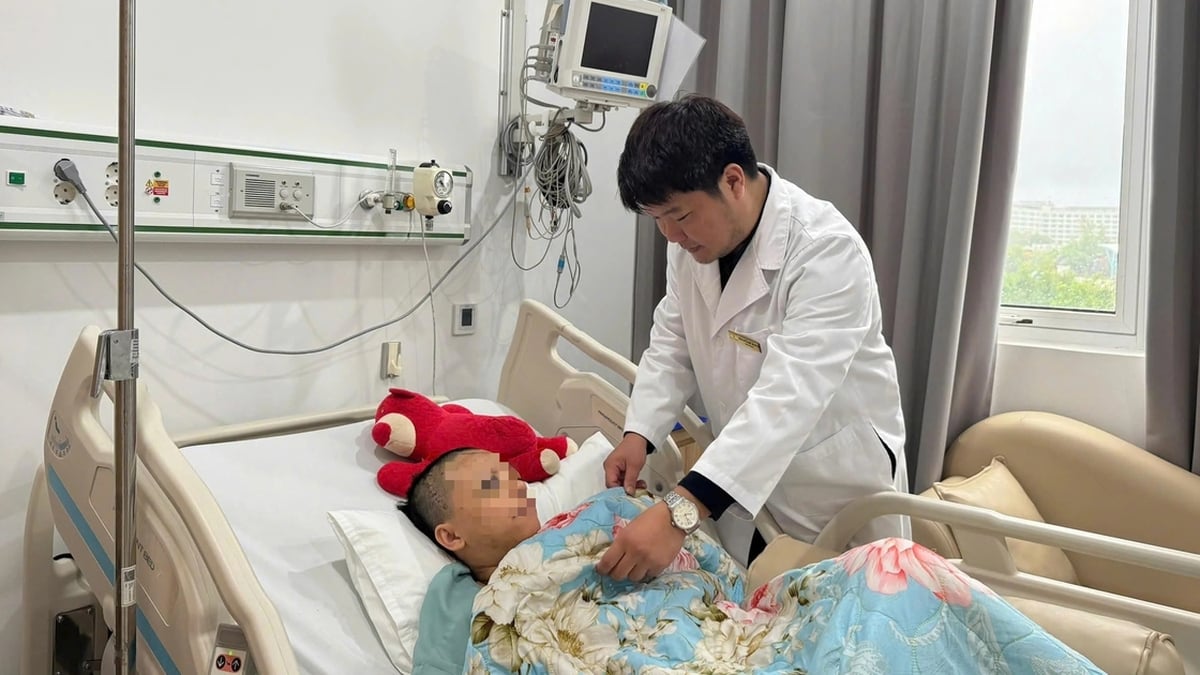Complications due to uncontrolled long-term use of corticosteroids
Recently, the Friendship Hospital received a case of corticosteroid abuse to treat gout. The male patient, 77 years old, from Hai Duong , was diagnosed with chronic gout for 15 years, but did not follow the doctor's prescription. Every time his joints were swollen and painful, this patient bought powdered medicine from a local herbalist to take. After taking it, the patient felt less pain, had a good appetite and gained weight. However, recently, the patient saw more tophi (nodules around the joints), more painful and swollen joints, more painful and swollen joints, thin skin and many bleeding spots on the skin. In the past 6 months, the frequency of acute gout attacks increased, taking powdered medicine did not help much, the joints were swollen, painful and deformed, making it difficult to walk, so the patient went to the hospital for treatment. The patient was admitted to the hospital with pain and swelling in many joints (left elbow, knee and ankle joints on both sides), many tophi in the lower legs on both sides causing joint deformity and loss of joint function, drug-induced adrenal insufficiency, chronic kidney failure and blood sugar disorders.

Patients with chronic gout abuse drugs containing corticosteroids to treat the disease, leading to many side effects.
Dr. Nguyen Thi Hoa, Head of the Department of Orthopedics, Friendship Hospital, said that at this time, it will be difficult to treat and control the disease and its complications, and the risk of disability is very high. According to Dr. Hoa, the above patient's case is not an isolated case. Currently, there are also cases of people with other diseases who abuse drugs containing corticosteroids to treat their diseases. The Orthopedics Clinic and the inpatient treatment area of Friendship Hospital have received many cases of both male and female patients who come to the clinic with symptoms of Cushing's syndrome (also known as pseudo-Cushing's syndrome) - a consequence of corticosteroid abuse or complications due to uncontrolled prolonged use of corticosteroids.
“The reason why drugs containing corticoid ingredients are often abused to treat diseases is because corticoids are used to treat many different diseases, from ear, nose and throat diseases, respiratory diseases, allergic urticaria, musculoskeletal diseases due to their strong anti-inflammatory and immunosuppressive effects, helping patients feel comfortable and quickly reducing disease symptoms,” said Dr. Hoa.
Currently, there is also a situation where drugs of unknown origin, traditional medicine, and self-proclaimed oriental medicine are widely sold online, including corticoid ingredients mixed in to quickly “suppress” symptoms. Patients are completely unaware, so many people take them for months, even years, because each time they take them, they feel better very quickly. In addition, patients can easily find drugs containing corticoids at pharmacies without a doctor’s prescription. These are the reasons why the abuse of drugs containing corticoid ingredients to treat diseases is becoming more and more common.
How to solve the problem of corticoid abuse?
Some common diseases that are affected by corticosteroid abuse are musculoskeletal diseases: chronic back pain, osteoarthritis, inflammatory joint diseases (gout, rheumatoid arthritis, ankylosing spondylitis, etc.), tendonitis & tendon attachments, etc. Allergic - immune diseases: eczema, asthma, allergic rhinitis, urticaria, psoriasis, autoimmune diseases such as systemic lupus erythematosus, etc. Infectious diseases: upper respiratory tract infections, urinary tract infections, etc. (often prescribed with antibiotics to quickly relieve symptoms).

Many patients abuse corticosteroids without anticipating the side effects of these drugs.
Dr. Nguyen Thi Hoa said that corticosteroids have diverse effects and can treat many different diseases. However, the side effects of this drug are also quite a few, for example: Weight gain, water retention, facial edema, eyelid edema; Immunodeficiency; Adrenal insufficiency, Cushing's syndrome secondary to the drug; Gastric and duodenal ulcers; Blood sugar disorders; Hypertension; Electrolyte disorders; Mental disorders; Secondary osteoporosis, osteoporosis-related fractures; Aseptic necrosis of bone; Eye diseases...
The side effects of corticosteroids are very diverse, depending on the dosage, route of administration and duration of drug use. Patients with side effects of corticosteroids often have the following symptoms: On the skin: thin skin, easy bruising, stretch marks, hirsutism, acne, slow wound healing; On the endocrine system: blood sugar disorders, electrolyte disorders, adrenal insufficiency, menstrual disorders in women, pseudo-cushing syndrome due to prolonged use of corticosteroids...; On the digestive system: epigastric pain, belching, heartburn, gastroduodenal ulcers, gastroesophageal reflux, gastrointestinal bleeding...; On the cardiovascular system: high blood pressure, dyslipidemia, atherosclerosis; On the musculoskeletal system: secondary osteoporosis, fractures, aseptic necrosis of bone; On the eyes: glaucoma, cataracts.
Experienced doctors when encountering patients with the phenotype of Cushing's syndrome will immediately recognize it with typical characteristics: water retention, round face like the moon, hirsutism, possibly a mustache in women, thin skin, easy bruising, subcutaneous bleeding in patches, patches; may have a fatty tumor between the shoulders, central obesity, fat distribution disorder (fat concentrated in the trunk, muscle atrophy of the limbs) likened to a toothpick body with a potato, with pink or purple stretch marks on the skin of the abdomen, thighs, possibly also on the chest, arms, legs. When doing further tests, it is possible to detect blood sugar disorders, electrolyte disorders, adrenal hormone abnormalities, osteoporosis, vertebral collapse, ... Especially when the patient's body is using corticosteroids for a long time and suddenly stopping can cause many dangerous complications such as acute adrenal insufficiency, severe electrolyte disorders, even life-threatening if not treated promptly.
According to Dr. Nguyen Thi Hoa, drugs containing corticosteroids are a double-edged sword, so they need to be prescribed by experienced doctors in the correct and sufficient doses to treat the disease and minimize unwanted side effects. To address the current situation of corticosteroid abuse, both medical staff and patients need to change. On the patient's side, every time they get sick, they need to see a doctor to understand the disease and get advice on appropriate medication, avoiding the fear of using an old prescription when the disease recurs. Do not arbitrarily buy anti-inflammatory pain relievers, use liquid medicines, or cigarettes of unknown origin to treat the disease. When buying any medicine at a pharmacy without a prescription, you need to carefully research whether the ingredients contain corticosteroids or not, including nasal and throat sprays, topical medications, and eye drops.
“For medical staff, it is necessary to be stricter in prescribing, only using corticosteroids in cases of real necessity, using them for a short time with the smallest effective dose. It is necessary to carefully advise patients about the risks and side effects that may occur when using corticosteroids for a long time. If the condition requires long-term use of corticosteroids, there must be preventive treatment methods to minimize possible complications,” Dr. Nguyen Thi Hoa stated.
Source: https://baolaocai.vn/lam-dung-thuoc-chua-thanh-phan-corticoid-muon-tac-dung-phu-nguy-hai-post879787.html




































































![[Photo] Party and State leaders visit President Ho Chi Minh's Mausoleum and offer incense to commemorate Heroes and Martyrs](https://vphoto.vietnam.vn/thumb/402x226/vietnam/resource/IMAGE/2025/8/17/ca4f4b61522f4945b3715b12ee1ac46c)






























Comment (0)